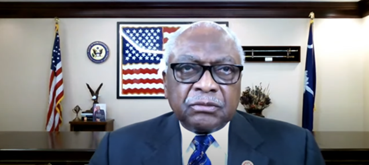Chairman Clyburn’s Opening Statement at Hearing on “Preparing for and Preventing the Next Public Health Emergency: Lessons Learned from the Coronavirus Crisis”
Washington, D.C. (December 14, 2022) – Below is Select Subcommittee on the Coronavirus Crisis Chairman James E. Clyburn's opening statement, as delivered, for a hearing on "Preparing for and Preventing the Next Public Health Emergency: Lessons Learned from the Coronavirus Crisis" with witnesses testifying on the public health and economic impacts of the coronavirus and exploring many of the 30 recommendations for preparing for and preventing future public health emergencies, as detailed in the committee's final report.
Click here to watch

Opening Statement
Chairman James E. Clyburn
Select Subcommittee on the Coronavirus Crisis
Hearing on "Preparing for and Preventing the Next Public Health Emergency: Lessons Learned from the Coronavirus Crisis"
December 14, 2022
For the past two and a half years, the Select Subcommittee has devoted itself to investigating the effectiveness, efficiency, and equity of the nation's response to the coronavirus crisis.
Our committee was formed in April 2020—at a moment of deep devastation and great uncertainty caused by the dual threats of a deadly virus and resulting economic catastrophe.
Modeled after the Truman Committee—which rooted out waste, fraud, and abuse during World War II—we sought to identify and stop those who would take advantage of our vulnerabilities during that terrible time, and to make real improvements to our pandemic response.
During the past two and a half years, we have investigated all aspects of how the crisis impacted American lives and livelihoods. We have held 42 hearings and briefings, released 37 reports and analyses, and heard testimony from dozens of key officials.
Today's hearing will explore how to use the lessons our committee has learned during the crisis and its aftermath to make sure we are prepared for the future.
The coronavirus crisis was the worst public health crisis our nation has faced in more than a century. In the nearly three years since the first case of COVID-19 was confirmed in the United States, more than 100 million Americans have been infected with the virus—some with lasting consequences—and over 1 million Americans have lost their lives. The United States was hit much harder than its peer nations, suffering a significantly higher mortality rate than countries like Australia, Germany, and Japan.
Compounding this devastating loss, as Americans took difficult yet necessary precautions to protect themselves and their communities from the virus, tens of millions of Americans lost their jobs. Millions more saw their hours and incomes reduced or their small businesses closed during this time. Many of these Americans struggled to feed their families and to stay in their homes.
This outcome was not inevitable. Our nation entered the coronavirus crisis unprepared for its magnitude.
Our nation's public health infrastructure was underdeveloped well before the coronavirus pandemic. Elderly, minority, rural, and low-income populations were particularly vulnerable because of longstanding health and economic disparities.
On top of these existing vulnerabilities, the previous administration chose to minimize the coronavirus and discourage proven health measures, while undermining the scientists leading the pandemic response.
But today's hearing is not about looking back. We must take stock of what we have learned so we can determine how to move forward.
Based on the committee's two and a half years of oversight work, our final report—which we will consider and adopt immediately following this hearing—includes 30 recommendations that inform what we need to do to prevent and prepare for future crises.
We must invest in next-generation tools—including vaccines and treatments—to be prepared not only for future variants of the coronavirus, but for other unknown pathogens that may reach us in the future.
We must strengthen supply chains, increase domestic manufacturing, and ensure our stockpiles are well supplied to make sure essential workers are not left exposed when the next emergency comes.
We must enact universal paid sick, medical, and family leave to help Americans protect not only their jobs, but the health of their families and co-workers in times of need.
We must improve the federal government's ability to deliver emergency relief to Americans and loans to businesses during times of crises, while also improving our ability to protect relief programs from fraud.
We know that the coronavirus crisis is not the last public health or economic emergency our country will face. But there is more we need to do to prevent the next emergency, and to be ready when it happens.
I would like to thank all our witnesses for testifying today. I look forward to hearing more about the actions that we can take now to prepare for and prevent the next public health emergency.